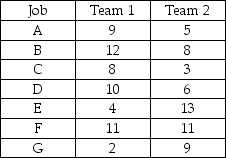Table J.17
A company must take on seven new projects. Each project has a planning stage and a design stage, and the planning stage must be completed before the design stage can begin. Also, two project teams are available to work on these projects: Team 1 works only on planning stages of projects, and Team 2 works only on design stages of projects. The times to complete the project stage, in days, are shown in the following table.

-Using the information in Table J.17 and Johnson's rule, develop a schedule that minimizes makespan for these seven jobs. Assume that job C could be neatly split into two equal parts, each having half of the processing time on each machine as the full job C. Using your original sequence, but splitting job C, what is the reduction in makespan for the seven jobs?
Definitions:
Long Position
The purchase of a security such as a stock or commodity with the expectation that the asset will increase in value.
Futures Contract
A formal contract for purchasing or selling an item at a pre-set price at a future date.
Maturity
The date on which the principal amount of a financial instrument is scheduled to be repaid.
Daily Settlements
The process by which futures contracts are revalued at the end of each trading day based on the closing market prices to reflect gains and losses.
Q3: Currency swaps are often used to provide
Q4: Discuss producer's risk and consumer's risk.
Q4: One assumption of linear programming is that
Q8: What is meant by time compression in
Q10: An increase in the supply of U.S.dollars
Q13: Economic exposure is based on the extent
Q19: Which one of the following relationships is
Q21: Transaction gains and losses that result from
Q31: Argentina is seeking balance-of-payments financing from an
Q75: A quality manager has established a sampling